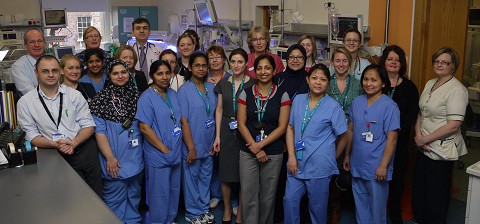Most babies are in good health at birth but around 10% will require admission to the neonatal unit. A large number of our patients are born less than 32 weeks gestation and weigh less than 1500 grams. Small premature babies (born before 34 weeks gestation) and sick bigger babies will be admitted to the neonatal unit for observation, treatment and ongoing care.
The Rotunda Hopsital Dublin
Neonatal Unit
The neonatal unit in the Rotunda has been providing care for all sick or premature infants born in the hospital and those transferred from other hospitals since the 1950s. The present unit was completed in 2002 and is situated on the second floor of the Hospital.
Neonatal Unit
Bigger babies are transferred back to their mothers on the postnatal ward once their condition improves. Premature babies, because they are born early, may take some time before they are well enough to go home. Babies transferred from other hospitals to the Rotunda for intensive care will be transferred back to their referring hospital for ongoing care once their condition is stable enough to allow their transfer.
For more information, you can download our Parent’s Guide to the Neonatal Unit booklet.
Neonatal Unit
Who will look after my baby?
Every year, we have about 1400 babies admitted to our neonatal unit. The majority of those babies are born in the Rotunda Hospital. The team caring for your baby is multi-disciplinary in nature. This means that healthcare workers with different areas of expertise contribute to the day to day care of your baby.
The Neonatal Unit is staffed around the clock with specially qualified Neonatal Nurses/Midwives. A Neonatal Registrar and/or Advanced Nurse Practitioner (Neonatology) and a Senior House Officer are on duty at all times. A Consultant Neonatologist is always contactable.
Our philosophy is to provide a high standard of holistic care to all sick newborns and their families. We see the babies in our care and their families as central to the activity in the unit so you matter to us and we will try to support you during what is a very traumatic and difficult time. We will always be happy to keep you fully informed about your baby’s progress and to answer your questions.

Neonatal Unit
Your Baby and You
The initial shock of seeing a small baby for the first time can be very frightening for parents. Your first thoughts may be that your baby is so small and fragile that you may cause pain or distress by touching him. This is a common reaction and staff are always available to help you.
At first if he is ill, rest is very important for him so handling is minimised. We may also ask you not to stimulate him too much in this early stage. You may not be able to hold him straight away. Nevertheless he will know your voice so do spend some time talking to him and gently touching him if he is able. As he becomes stronger he will come out for cuddles and kangaroo care.
You can also help with his cares (nappy changes, feeds etc) and other tasks important to his comfort. This time spent with him helps create a strong bond between you all. You will get to know him, discover his unique personality and identify and recognise his needs. With time you will become very comfortable with handling and caring for him and even if you feel a little nervous, remember you are not alone.
Upon arrival to the unit, a photograph will be taken for you and thereafter, please bring in your own camera or video recorder. Take plenty of photos to see how he is growing. Please don’t photograph or video the other babies or staff in the unit.
If you had a vacuum delivery, you may also notice a soft round cup mark on top of the baby’s head. Overlapping or a cup-mark are both normal. Don’t worry; by the end of a week your baby’s head will regain the normal round shape.
Neonatal Unit
Feelings and Reactions
The strain of having an infant in the Neonatal Unit can put tremendous pressure on your relationship. The neonatal journey is a similar experience for everyone but also unique for each person so it is very hard to describe the normal reaction to having an ill or premature baby. Some parents are drawn closer together but even the most loving relationship can come under strain.
A lot of parents can feel isolated from each other. It can be difficult to go on caring and thinking about each other while both of you are caught up in your own thoughts and feelings. Families are all different. Each person may have different ways of handling and expressing these feelings. Talking to each other comes easily for some couples but for others it is much harder, yet usually it is the talking that makes things bearable.
Tears are sometimes seen as a sign that parents are not coping when in fact they are a reaction to what has happened. Some parents find it helpful to keep a diary, with just a few lines each day of how your baby is progressing or of little events that happen. It will be lovely to look back on later.
Neonatal Unit
Going Home
If your baby has been in the neonatal unit for a long time, going home is a very exciting time but it can also be very overwhelming. Your baby will be ready for discharge when s/he is feeding well, keeping warm in a cot and gaining weight. The midwifery and nursing staff along with our neonatal discharge coordinator will guide you on how to care for your baby at home.
The following links provide help and support to the families of preterm babies:
www.inha.ie
www.bliss.org.uk
Neonatal Unit
Frequently Asked Questions
What should I do if my baby has trapped wind?
Trapped wind can give rise to tummy pains and the baby will cry and will not settle after the feed. There are simple techniques that usually work to deal with wind, like holding your baby up against your chest as well as gently massaging the baby’s back. Sometimes walking up and down stairs with your baby held against your or your partner’s chest can help to shift the baby’s trapped wind.
How do I know if my baby is getting enough milk?
Some babies will take to feeding without any problems while others need a little bit of encouragement. Your midwife will guide you on feeding; for most babies we recommend that you feed them when they seem to want it -‘demand feeding’. Small or jaundiced babies may require more frequent feeds.
You will recognise when your baby has had enough because they:
are happy and active
sleep well between feeds and
have wet and dirty nappies.
It is common for babies to lose a small amount of weight in the first few days; however, your baby should return to their birth weight by the time they are two weeks old. The midwife will weigh your baby before you go home from hospital. The public health nurse will also check your baby’s weight when she visits you at home. If you have any concerns about your baby’s weight always ask for advice early from your midwife or doctor.
My baby has facial spots or a rash – what should I do?
Many babies have milk spots on their nose or face, which usually disappear in a few weeks without treatment. Newborns can develop spots on their bodies as they get used to the outside world. Generally these spots appear for a short time and then disappear. Please consult your midwife, public health nurse or GP if you are concerned about spots on your baby.
‘Sticky eyes’ – are they a problem?
‘Sticky eyes’ are usually due to a mild eye infection. You can usually solve the problem by gently cleaning the affected eye with a piece of cotton wool dipped in cooled boiled (sterile) water. Use each piece of cotton wool just once and wipe the eyes from the inside (near the nose) to the outside. Sometimes a baby will need an antibiotic depending on the infection.
Why is my baby crying?
Crying is baby’s natural way of communicating. While you were pregnant your baby let you know they were happy with their movement and kicking, now the baby is more vocal and there are many reasons for crying.
As you get to know your baby you will begin to understand their different cries and what each one means. Reasons for crying can include that your baby:
is hungry or thirsty;
has a wet or dirty nappy and needs a change;
has trapped wind or colic;
is either too hot or too cold;
is sick or in pain; or
is lonely and wants a cuddle and some attention.
How to soothe a crying baby
Pick your baby up and hold them close to your body.
Talk or sing to your baby and gently massage their back.
Feed your baby.
Change their nappy.
Go for a short walk with your baby.
If your baby continues to cry, ask another member of the family to take over as sometimes the baby can sense if you are under stress. It is best to seek medical advice as soon as possible if:
you think the baby is in pain;
the type of crying is unusual;
the baby is pale
the baby has a purple or red rash on its body; or
the baby feels hot.
Remember never shake your baby as this can damage the baby’s body and brain.
What do I need to know about vomiting?
Young babies frequently bring up some of their feed, which is called ‘posseting’, particularly if they are trying to bring up wind – this is normal. You only need to tell your midwife or doctor if:
the vomiting is forceful or repeated effortlessly and
occurs after every feed.
My baby has loose stools, why?
Your baby will pass a sticky green-black bowel motion for the first few days. This is called meconium; following this the stools turn yellowish. Formula fed babies commonly pass firmer stools than breastfed babies. However, if you find the baby is constantly passing very runny stools tell the midwife or doctor because a baby can become dehydrated quickly.
How do I prevent nappy rash?
The ammonia in urine can irritate the soft skin of a baby’s bottom and could lead to nappy rash. To avoid this becoming a problem, wash your baby’s bottom with warm water at each nappy change even if it is only a wet nappy. Avoid baby wipes in the early days as the perfume and chemicals in them may irritate the baby’s skin.
If you notice your baby’s bottom becoming red then use a small amount of a barrier cream until it improves. Do not use talcum powder on newborn skin.
